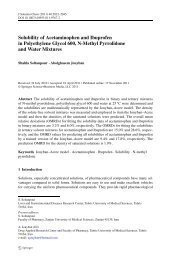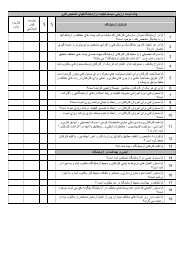new insights into the prevention and treatment of bulimia nervosa
new insights into the prevention and treatment of bulimia nervosa
new insights into the prevention and treatment of bulimia nervosa
You also want an ePaper? Increase the reach of your titles
YUMPU automatically turns print PDFs into web optimized ePapers that Google loves.
4<br />
New Insights <strong>into</strong> <strong>the</strong> Prevention <strong>and</strong> Treatment <strong>of</strong> Bulimia Nervosa<br />
vulnerability towards developing eating disorder symptoms as a coping mechanism. Eating<br />
disordered individuals are also less likely to utilise support from o<strong>the</strong>rs, particularly due to<br />
a negative attitude towards emotional expression (Meyer et al 2010). In terms <strong>of</strong> relationship<br />
satisfaction, women with eating problems report more discomfort with closeness <strong>and</strong> have<br />
been described to fear intimacy with a partner (Evans & Wer<strong>the</strong>im, 1998; Pruitt et al, 1992).<br />
Therefore in view <strong>of</strong> <strong>the</strong> correlation between interpersonal problems <strong>and</strong> BN, it is not<br />
surprising that a specific <strong>the</strong>rapy aimed at helping patients with interpersonal problems<br />
(IPT) was considered as a <strong>treatment</strong> <strong>of</strong> this disorder.<br />
3. The development <strong>of</strong> Interpersonal Psycho<strong>the</strong>rapy (IPT)<br />
IPT was developed for <strong>the</strong> <strong>treatment</strong> <strong>of</strong> depression <strong>and</strong> originates from <strong>the</strong>ories in which<br />
interpersonal functioning is recognised to be a critical component <strong>of</strong> psychological wellbeing.<br />
The work <strong>of</strong> 1930’s psychiatrist Harry Sullivan first suggested that patients’ mental health was<br />
related to <strong>the</strong>ir interpersonal contact with o<strong>the</strong>rs. Challenging Freud's psychosexual <strong>the</strong>ory,<br />
Sullivan emphasized <strong>the</strong> role <strong>of</strong> interpersonal relations, society <strong>and</strong> culture as <strong>the</strong> primary<br />
determinants <strong>of</strong> mental health (Sullivan, 1968). Sullivan’s work was fur<strong>the</strong>r developed by<br />
Gerald Klerman <strong>and</strong> Myrna Weissman in <strong>the</strong> 1980’s, who studied depression <strong>treatment</strong>s using<br />
<strong>the</strong> interpersonal approach. Whilst studying <strong>the</strong> efficacy <strong>of</strong> antidepressants, alone or paired<br />
with psycho<strong>the</strong>rapy, it was found that ‘high contact’ counselling was effective, leading to <strong>the</strong><br />
fur<strong>the</strong>r development <strong>of</strong> <strong>the</strong> <strong>the</strong>rapy which was renamed interpersonal psycho<strong>the</strong>rapy<br />
(Klerman et al, 1984). These positive results led to <strong>the</strong> inclusion <strong>of</strong> IPT in <strong>the</strong> NIMH Treatment<br />
<strong>of</strong> Depression Collaborative Research Program, which compared this <strong>the</strong>rapy with<br />
antidepressants, placebo <strong>and</strong> Cognitive Behavioural Therapy (CBT) for depression (Elkin et al.,<br />
1989). As a part <strong>of</strong> this study <strong>the</strong> original IPT manual, Interpersonal Psycho<strong>the</strong>rapy for<br />
Depression, was published as a manual for <strong>the</strong> research project (Klerman et al, 1984). Patients<br />
in all conditions showed significant reduction in depressive symptoms <strong>and</strong> improvement in<br />
functioning, those having <strong>the</strong> antidepressant Imipramine plus clinical management generally<br />
doing best, <strong>the</strong> two psycho<strong>the</strong>rapies second best, <strong>and</strong> placebo plus clinical management worst.<br />
There was no significant difference between <strong>the</strong> two psycho<strong>the</strong>rapies.<br />
Since <strong>the</strong>n, <strong>the</strong>re have been several systematic reviews <strong>of</strong> studies investigating <strong>the</strong> efficacy<br />
<strong>of</strong> IPT for depression (Jarrett & Rush, 1994; Klerman, 1994; Feijo de Mello et al., 2005). They<br />
concluded that IPT was superior to placebo in nine <strong>of</strong> thirteen studies <strong>and</strong> better than CBT<br />
overall. However IPT plus medication was no more effective than medication alone. The<br />
researchers also found that several factors were associated with good <strong>the</strong>rapy outcome,<br />
including <strong>the</strong> ability to engage in more than one perspective <strong>and</strong> to take responsibility for<br />
actions, empathy for o<strong>the</strong>rs, a desire to change, good communication skills, <strong>and</strong> a sense <strong>of</strong><br />
cooperation <strong>and</strong> willingness to engage with <strong>the</strong> <strong>the</strong>rapist.<br />
Feske et al (1998) examined predictors <strong>of</strong> outcome in 134 female patients with major<br />
depression, <strong>and</strong> found that those who did not improve experienced higher levels <strong>of</strong> anxiety<br />
<strong>and</strong> were also more likely to meet diagnostic criteria for panic disorder. In addition, <strong>the</strong>y<br />
found that poor outcome was associated with greater vocational impairment, longer<br />
duration <strong>of</strong> episode, more severe illness, <strong>and</strong> surprisingly, lower levels <strong>of</strong> social impairment.<br />
O<strong>the</strong>r authors have found that despite comparable efficacy between IPT <strong>and</strong> CBT, IPT was<br />
more affected by personality traits <strong>and</strong> <strong>the</strong>refore less suitable for those with personality<br />
disorders (Joyce et al. 2007).














![focuspdca.ppt [Compatibility Mode]](https://img.yumpu.com/22859457/1/190x146/focuspdcappt-compatibility-mode.jpg?quality=85)


